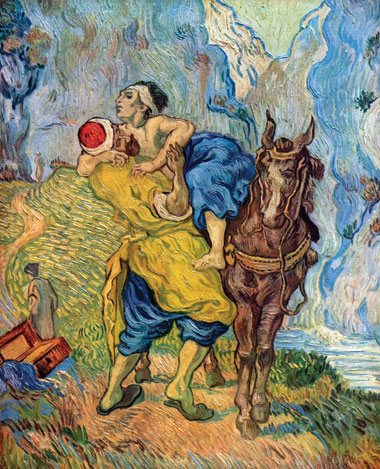 The conversation began well enough: “Teacher, what must I do to inherit eternal life?” Luke's Gospel implies the lawyer was testing Jesus with the question, but Jesus doesn't seem put off by that. He sought common ground: “What is written in the law? What do you read there?” (see Luke 10:25-37; all references NRSV).
The conversation began well enough: “Teacher, what must I do to inherit eternal life?” Luke's Gospel implies the lawyer was testing Jesus with the question, but Jesus doesn't seem put off by that. He sought common ground: “What is written in the law? What do you read there?” (see Luke 10:25-37; all references NRSV).
Both men knew the heart of Israel's faith: “Hear, O Israel: The Lord is our God, the Lord alone. You shall love the Lord your God with all your heart, and with all your soul, and with all your might” (Deuteronomy 6:4-5). The lawyer also understood the Torah to say, “and love your neighbour as yourself” (Leviticus 19:18). So Jesus replied, “Do this, and you will live.”
As the lawyer searched his own heart he realized there was more: “But to justify himself, he asked Jesus, 'And who is my neighbour?' ” Jesus didn't back down from the question, but neither did he answer it directly. He is a “teacher” (see Luke 10:25), and good teaching is often indirect. Instead, Jesus told a story: “A man was going down from Jerusalem to Jericho, and fell into the hands of robbers….”
Good stories often work in threes where the third character in each story is the climax, such as in Goldilocks and the Three Bears or the Three Little Pigs. In Jesus' parable, the priest and Levite pass by the wounded man. “But a Samaritan … when he saw him, he was moved with pity” (Luke 10:33). A Samaritan? An outsider? A despised cousin in the faith? Just days before, Jesus himself was refused acceptance by a Samaritan village “because his face was set toward Jerusalem” (see Luke 9:51-53). It wasn't what the lawyer expected to hear. It felt like he had been blindsided.
Then he heard Jesus pose a question of his own: “Which of these three, do you think, was a neighbour?” The lawyer, still in shock, finally responded, “The one who showed him mercy.” Luke doesn't tell us what happened to the lawyer after this encounter. Did he remain bound by his understanding of neighbour? Or did he risk expressing mercy to the outsider? We don't know.
What we do know from Luke's Gospel is that Jesus taught. This Teacher refused to be put off by questionable motives. He sought common ground. He responded to a question with a question of his own. He attempted to unlock the lawyer's binding perceptions with an imaginative story. Then he let the student go, trusting the parable to accomplish its task, and for the lawyer to show mercy to all neighbours, including the outsider.
Are you familiar with the scene in the movie Mr. Holland's Opus where Gertrude was about to give up playing the clarinet? Her squawks outnumbered the clear notes. Mr. Holland asked about her flaming red hair, and she acknowledged that her father said it reminded him of the sunset. “Play the sunset,” replied the teacher. And she did. Her changed perceptions led to a more confident and beautiful sound.
As I think back over my life I realize how blessed I have been with good teachers. They taught me in schools, coached me on teams, conducted me in musical ensembles and preached to me in Salvation Army congregations. However, I am concerned that the vocation of teaching is not always valued within the Army. Salvationist Roger Green writes: “[Salvationists] have not traditionally given the teacher and the preacher … the place of importance they have held in the historic Christian Church…. It is time now to affirm that the teacher, the theologian, the preacher is the person at the centre of our institutional life.”
Do those words jar us? Do not Salvationists embody Christianity “with its sleeves rolled up”? Are we not the “hand of God in the heart of the city”? Let's not polarize God's ways: the doing of ministry teaches and good teaching is ministry. Being a transforming influence in our communities requires transformative teaching. Grace teaches because grace seeks to persuade, not coerce.
The 21st century has its own perceptual worlds. For instance, the world of pornography views women and children as objects to be consumed. Some view cheating as a justifiable way to win, whether in sport or corporate management. These perceptions need to be changed.
Salvationists are called to love God and our neighbour. In order to do this we must help transform perceptions, we must teach.
“Teacher, what must I do …?”
Illustration: Vincent van Gogh, The Good Samaritan (after Delacroix), 1890
 Major Ray Harris is a retired Salvation Army officer. He enjoys watching Corner Gas reruns and running in Winnipeg's Assiniboine Park.
Major Ray Harris is a retired Salvation Army officer. He enjoys watching Corner Gas reruns and running in Winnipeg's Assiniboine Park.









I've had the awesome privilege of preaching/teaching to a responsive crowd who don't notice how long we've been at it, and if they do, they don't mind. They answer back and pose difficult questions on a casual Sunday morning. Hungry for the word, it's been a pleasure to study and be ready for them. What a unique way to do church. On to other things now, but what a great 10 months!
Thanks for teaching me so well. It's been years since we've met up but your lessons and challenges have stayed with me. You should teach an interactive bible study online each week and post the lesson in the Salvationist online for us to read. Hey, this is a great idea...are you reading this, Geoff Moulton!
Kathie Chiu
Major